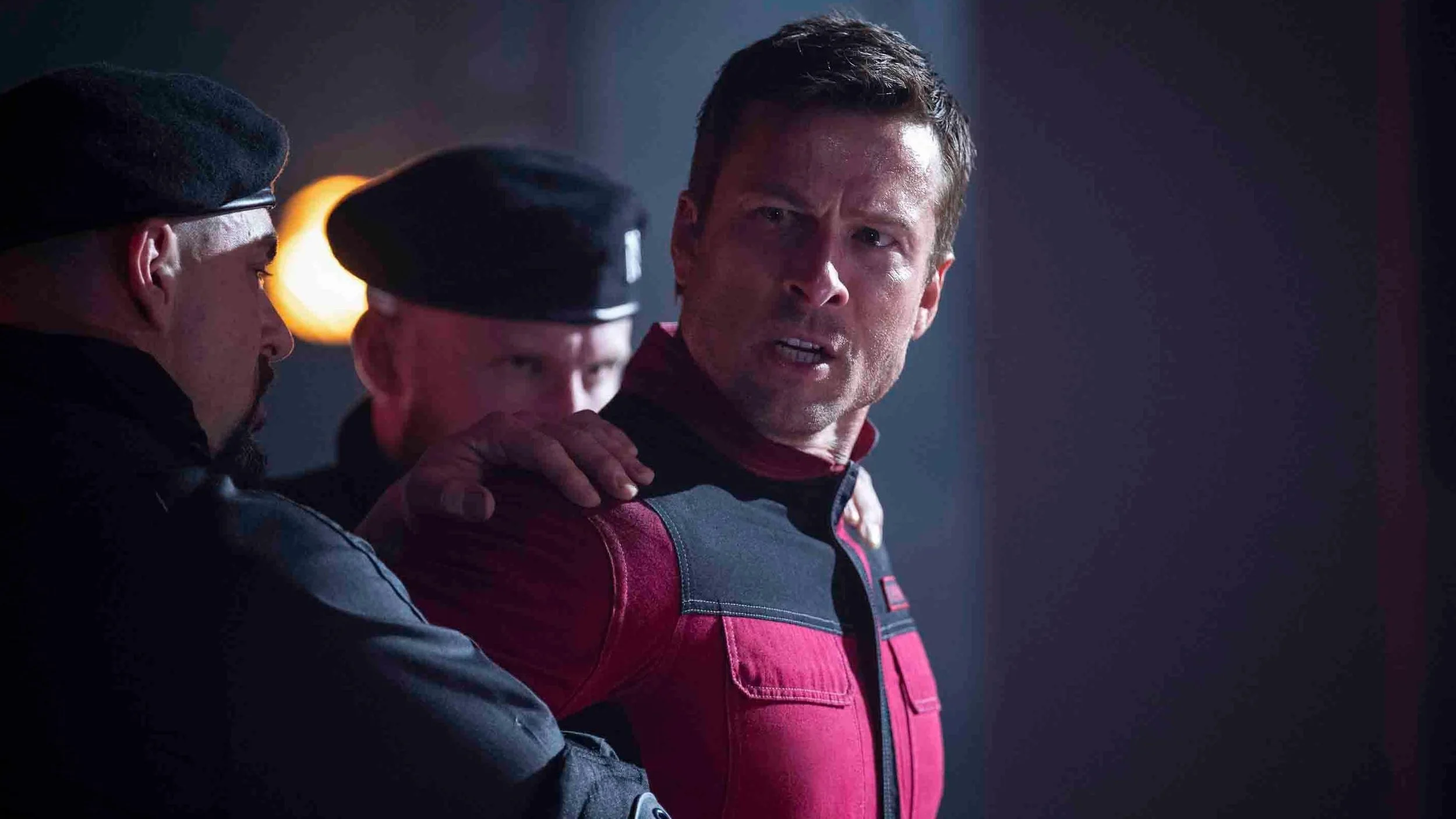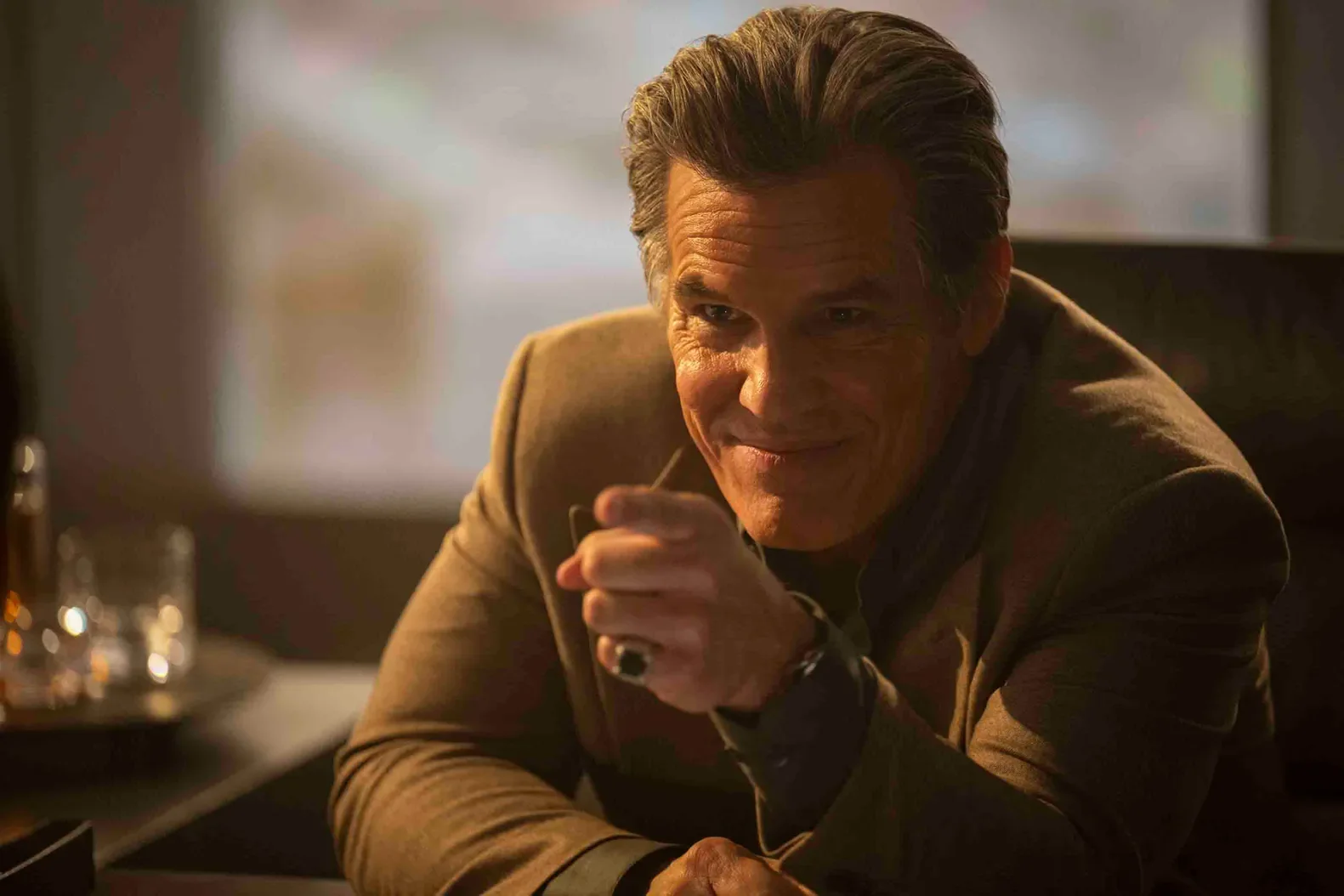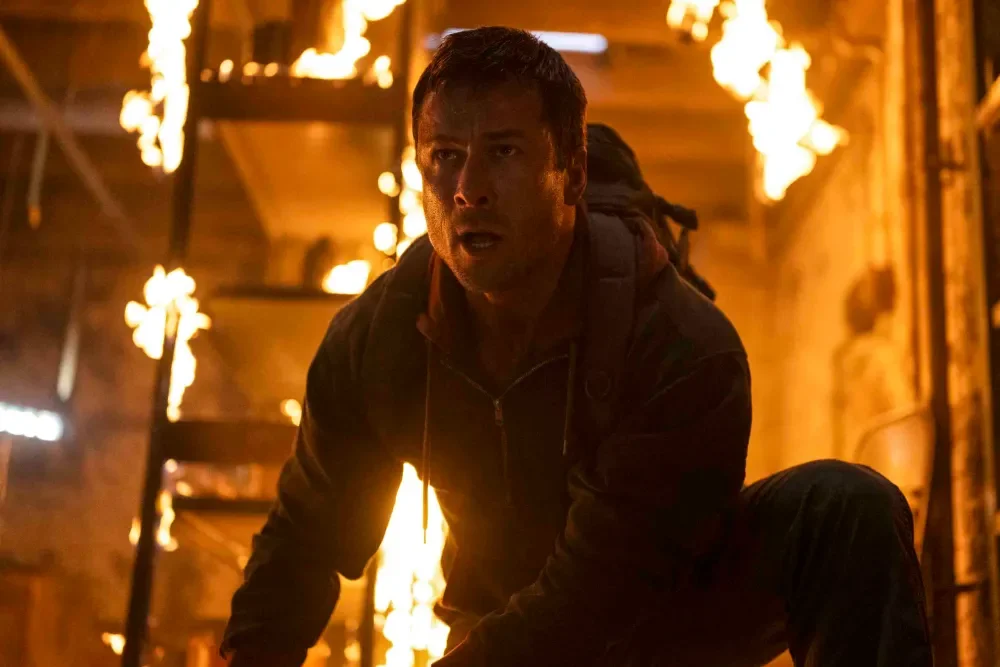‘The Running Man’ Review: Glen Powell Powers Through Edgar Wright’s Electrifying, Big-Screen Rebirth of Stephen King’s Dystopian Classic
Glen Powell in 'The Running Man.' Paramount Pictures
Edgar Wright delivers a propulsive, blood-pumping spectacle — a defiant middle finger to streaming and a masterclass in cinematic showmanship that turns Glen Powell into a full-fledged movie star.
Edgar Wright’s The Running Man doesn’t just remake a cult classic — it detonates it. Reimagined from Stephen King’s 1982 novel (written under his Richard Bachman pseudonym), Wright’s vision is a satirical gut-punch: a neon-drenched action epic about entertainment, control, and the commodification of suffering. It’s also, quite literally, the kind of movie we’ve been begging studios to make — one that looks, feels, and moves like it was built for the big screen.
Powell stars as Ben Richards, an everyman turned hunted outlaw who volunteers for a dystopian game show where the prize is survival and the cost is everything else. The premise — an authoritarian America using televised death to keep the masses pacified — feels disturbingly plausible in Wright’s hands. The year is 2025. The world looks like ours, just with more drones, more noise, and a few more billionaires pulling the strings.
Glen Powell in 'The Running Man.' Paramount Pictures
From its opening seconds, The Running Man sprints. Wright wastes no time setting the tone: propaganda clips pulse across the screen, newscasters recite corporate scripture, and the booming slogan — “Freedom is just another broadcast away” — fills the theater like a warning. The camera dives through the fluorescent labyrinth of The Network, the omnipotent media conglomerate that rules over a crumbling America. When it cuts to Powell’s Ben Richards, slumped in a smog-stained apartment beside his feverish daughter, the contrast hits like a freight train. This isn’t the clean dystopia of science fiction — it’s an all-too-recognizable extension of the world we already live in.
And then there’s Powell — the movie star finally meeting his moment. After Hit Man, Anyone But You, and Top Gun: Maverick, it’s clear he’s not just America’s charming leading man. Here, he’s raw, haunted, and ferociously physical — a blue-collar hero navigating Wright’s rhythmic chaos with equal parts swagger and sincerity. Grandpa and Pa clearly love dressing up; this marks his third transformation of the year, following Hit Man’s Chad Powers and now a blood-soaked gladiator sprinting for his life. He plays Ben like a man cursed with conscience in a world allergic to it.
The setup follows King’s original structure more closely than the 1987 Schwarzenegger version. Ben, a disgraced worker struggling to afford his daughter’s medicine, signs up for The Network’s latest spectacle: The Running Man, a reality show where fugitives are hunted for sport by celebrity assassins known as “Hunters.” The reward? A billion-dollar prize no one has ever lived long enough to claim. The twist? The entire nation watches every second.
As satire, The Running Man is more Network than The Hunger Games. Wright trades sleek futurism for absurdist realism, infusing his dystopia with garish commercialism and gallows humor. The Network’s hit reality shows — like “Spin the Wheel,” where contestants risk death for prizes — look like something that could air on actual prime-time television. Sean Hayes appears as the slimy host, radiating gleeful menace while peddling the illusion of choice to a starving public.
Glen Powell in 'The Running Man.' Paramount Pictures
When Ben finally enters The Running Man, the movie explodes. The action sequences are choreographed chaos — brutal, rhythmic, and captured with Wright’s signature kinetic flair. It’s less about spectacle for spectacle’s sake and more about velocity, using momentum to reflect desperation. In one standout sequence, Ben escapes through an abandoned subway, the camera whirling through a flickering labyrinth of broken ads and graffiti reading: “You’re already watching.”
As Ben’s rebellion gains traction, he becomes more than a contestant — he becomes a symbol. The oppressed see him as hope; the Network sells him as ratings. It’s this collision between propaganda and personhood that fuels the film’s beating heart.
Powell’s supporting cast fires on all cylinders. Colman Domingo steals every scene as Bobby T., a sadistic showman whose charisma curdles into cruelty. Josh Brolin brings icy corporate menace to Dan Killian, the executive whose hunger for control defines the Network’s rot. William H. Macy is quietly brilliant as Molie, an underground anarchist who disguises rebels as janitors. Emilia Jones adds warmth as Amelia, a privileged bystander who becomes Ben’s reluctant ally. Lee Pace makes an impression as McCone, a masked enforcer with a tragic backstory teased in chilling fragments. And Michael Cera, as Elton — a nervous hacker with a revolutionary streak — delivers comic relief so sharp it cuts.
Colman Domingo in 'The Running Man.' Paramount Pictures
Still, for all its wild invention, The Running Man is grounded by emotion. Wright has always been a romantic filmmaker beneath the style — and that sentiment seeps through here. Amid explosions and chases, there’s a tenderness in the way Wright shoots Ben’s flashbacks to his wife (Jayme Lawson) and daughter, the soft light of domestic life clashing with the neon glow of the games. It’s not subtle, but it’s sincere — and that sincerity gives the film its power.
In a quieter moment, as Ben hides in a ruined cathedral, Wright allows the camera to linger — the hum of drones echoing faintly overhead. “They say this is the land of the free,” Ben mutters. “So why does everyone look trapped?” It’s the kind of line that might sound heavy-handed in lesser hands, but Powell delivers it with the conviction of someone who’s finally stopped running from the truth.
The film’s production design is immaculate. From the buzzing TV studio — part Blade Runner, part Vegas nightmare — to the crowded backstreets of “Slumside,” every frame drips with cultural decay. Wright and cinematographer Bill Pope embrace exaggerated color and texture, giving the film the visual identity of a vintage arcade machine turned inside out. It’s alive, ugly, and undeniably cinematic.
Josh Brolin in 'The Running Man.' Paramount Pictures
But beneath the spectacle lies something more personal — a clear frustration with where filmmaking itself has gone. The Running Man feels like Wright’s rallying cry for theatrical experiences. It’s self-aware without being smug; passionate without being preachy. “We made this for the big screen,” he said at the U.S. premiere in New York, grinning like a man who just outran a studio note. He’s right. It’s the kind of movie that should rattle your seat, not autoplay in silence while you check your phone.
If there’s one complaint, it’s that Wright occasionally can’t decide whether to commit fully to the tragedy or the satire. The tonal shifts, particularly in the second act, are abrupt — but in a film this fearless, the rough edges feel almost intentional. By the time the climactic showdown arrives — part Network, part Mad Max: Fury Road, part pure Wright mania — it’s hard to imagine anyone else pulling it off.
POPULAR ON THE CINEMA GROUP
The final act detonates with precision, equal parts heartbreak and fury. Wright trades spectacle for symbolism, closing not on explosions but on consequences — what it means to fight a machine built to monetize pain. Ben’s revolution becomes something larger than survival, echoing through faces we only glimpse and lives we sense offscreen. And when the Network’s own walls start to crack, it’s not a cheer that rises, but a reckoning. The system eats itself, the screen goes quiet, and Wright leaves us with one unmistakable message: the age of watching is over.
Glen Powell in 'The Running Man.' Paramount Pictures
In the end, The Running Man isn’t just a remake. It’s a reclamation — of authorship, of ambition, of the idea that genre films can still say something urgent about who we are. Wright’s filmmaking is at its most ferocious here: stylized, political, absurd, and deeply human. Glen Powell proves himself more than a matinee idol — he’s a star who can shoulder the weight of modern dystopia and still flash a grin on the other side.
The result? A movie that quite literally runs circles around its predecessors — and around a culture that mistakes content for art.
So, stay tuned to Find out.
Rating: ★★★★☆
That’s a Wrap
|
The Running Man [2025]
|
That’s a Wrap | The Running Man [2025] |
“A muscular, electric, and surprisingly heartfelt reinvention that doubles as both spectacle and satire — Wright’s boldest cinematic statement since ‘Baby Driver.’”
CREDITS
Screened: AMC Lincoln Square | 7PM | November 9, 2025
Release Date: Friday, November 14 | Paramount Pictures
Cast: Glen Powell, William H. Macy, Lee Pace, Emilia Jones, Colman Domingo, Josh Brolin, Michael Cera, Jayme Lawson, Katy O’Brian, Daniel Ezra
Director: Edgar Wright
Screenwriters: Edgar Wright, Michael Bacall | Based on the novel by Stephen King
Rated: R | Runtime: 2h 13m




























